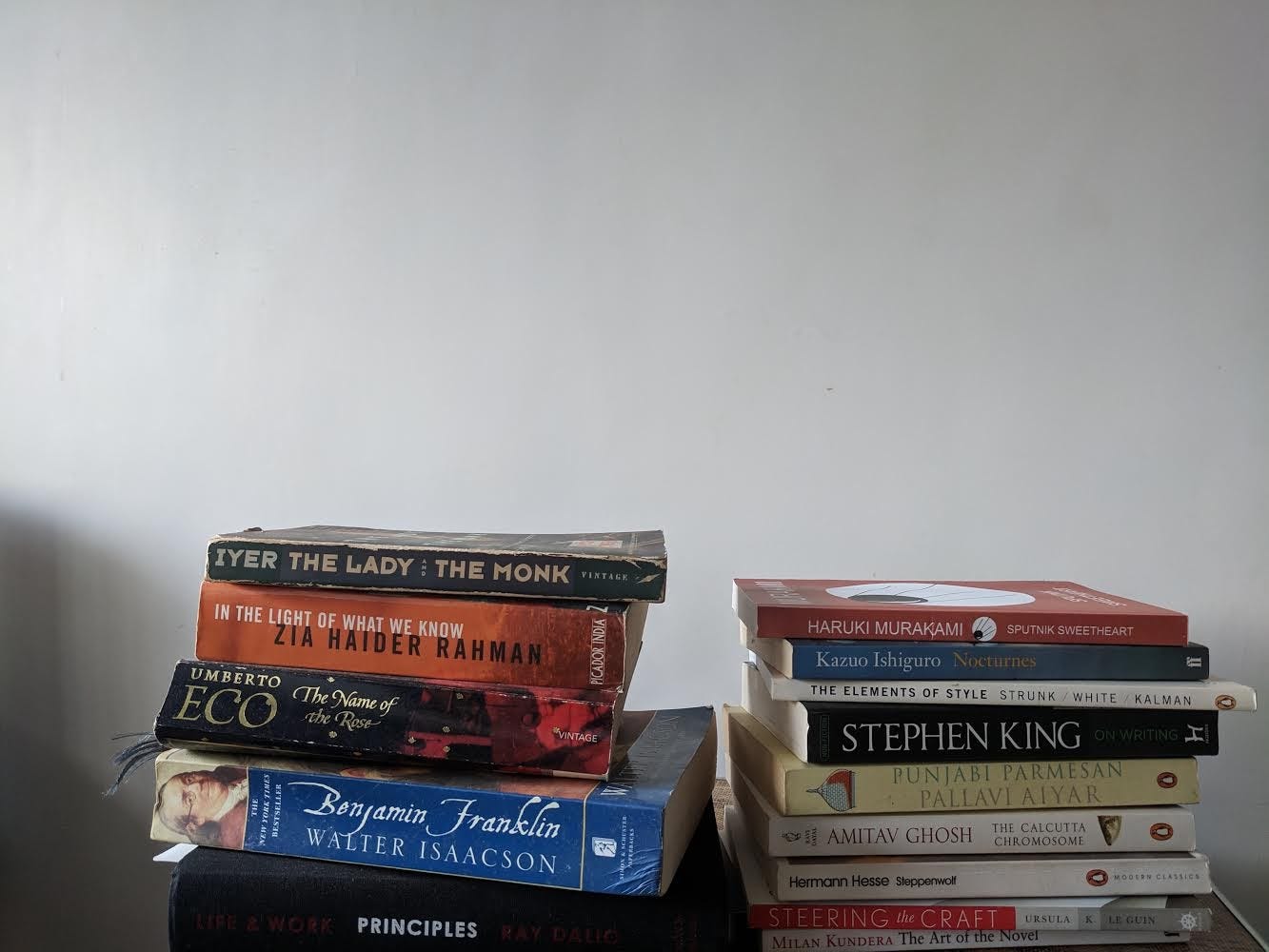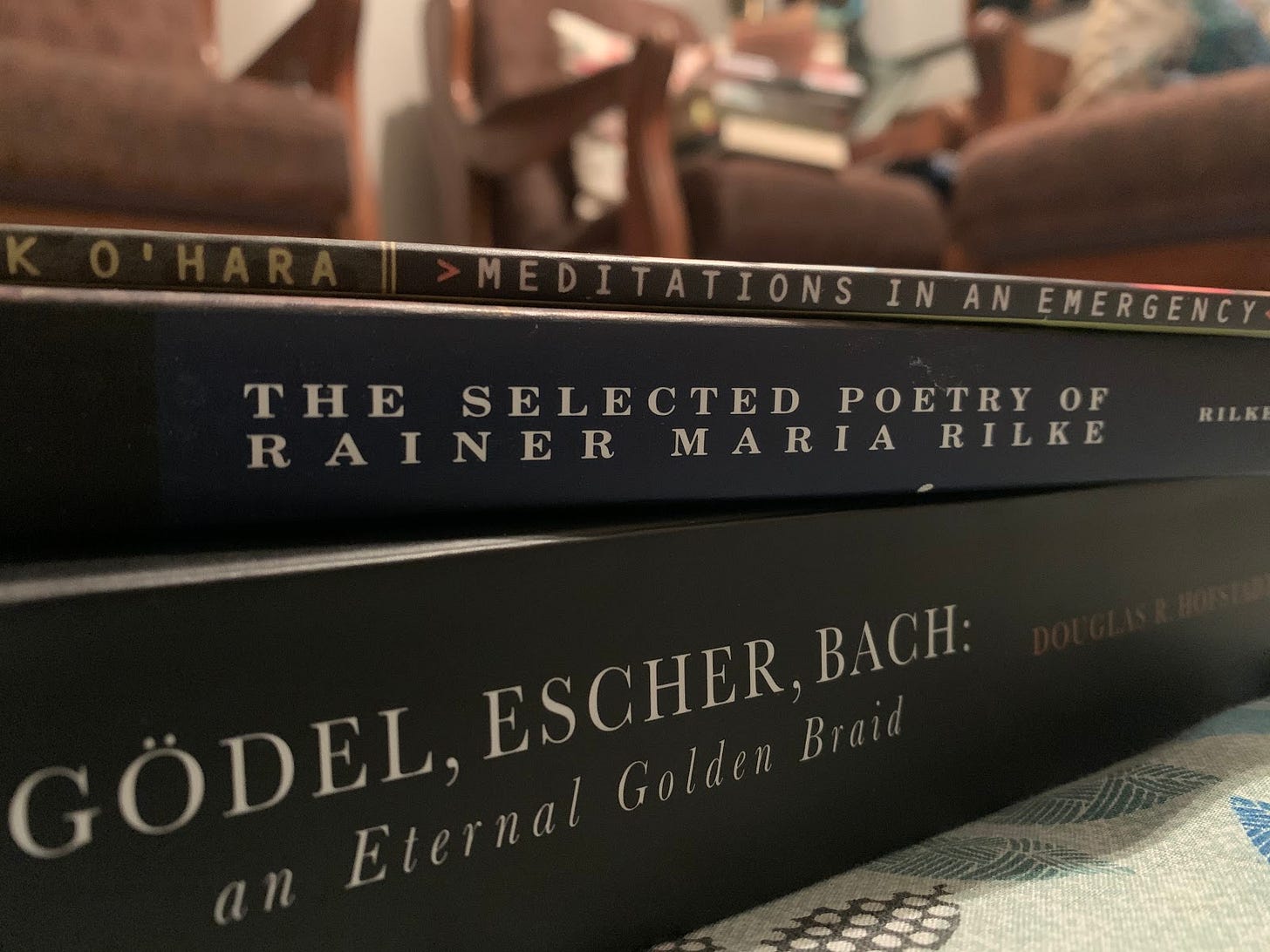At the beginning of this year, I saw a video of Umberto Eco walking through his gigantic library at his home. He walks through it as if in a maze.
That day as I sat slumped on my couch watching the video on loop, I thought wouldn’t it be nice to write a poem called ’I walk through my library on a January afternoon.
I haven’t written the poem, instead I do the closest you get to writing one- I write a letter, this.
Hi, I am Maneesh, and I write at Bombay Daak.
*
I happened to open the glass door of my library to look for an old notebook. My library is 7 feet tall but a square foot otherwise - wooden, polished with four shelves of varying heights.
To walk around my library is a religious experience. It is akin to temples, I walk around it, hands folded, praying that I find what I am looking for. It is not that the books aren’t organised, but my library is not only a catalogue of books but a history of my attempts at managing it as well. There is no sense of where to find what.
I suppose it is unorganised then.
A pandemic year makes you confront your failings with equanimity.
To walk through my library is to record my many phases of reading. While sizes decide where they go, the books themselves choose who they go with. There is a fellowship among them, bound by when I read them. A Theodore Roosevelt phase thus rests gainly between a set of poets and Latin authors. V.S. Naipaul sits (perhaps uncomfortably) with Chetan Bhagat, Le Guin’s Earthsea’s fantasy world of dark skinned heroes rests on the slender reality of Teju Cole’s corrupt Nigeria. Ghachar Ghochar, Goat Days and Good Soldier Sjvek stand together as if in a theme party of Alphabets, sharing esoteric jokes. Milan Kundera and Italo Calvino speak foreign tongues to Ishiguro and Pico Iyer who remain English. Jeet Thayil, Anuja Chauhan and Amitabha Bagchi sit next to each other as if at a lit fest. Manu Joseph has his own corner though, although I have left Mohammed Hanif close by.
Each book a piece of my own personal history, my state of mind, my curiosity.
To walk by my library is to see the world turn. My world view altered and to see the world from a distance as it makes its way through seasons, diminished and clouded one moment, stretching its seams under the sun the next. Malleable and liquid it flows the way rivers do from one genre to another, always taking a page with it, silting yet another with new words, yet contained within its banks.
*
Last year I made huge changes to my routine. On almost all days that meant reading undisturbed. As the summer season ended I began writing what I read, and the hours of my days expanded. As I read and wrote more I realised how small my world view had become. Stagnant since a decade. The larger routine of life had become stale.
I was inspired by the online libraries that I found in 2020. Well, individual bookshelves as a catalogue of links really, but they served the same purpose. I found the ones of James Somers and Patrick Collison captivating in particular.
I decided to learn new things with my expanded days, to course correct and then learn new ways of doing things. The hours complied, expanded more.
The best thing I learned was how to learn. I’m not surprised it is the most popular course on Coursera.
*
Along with my hours, my library also expanded last year. I bought a Kindle after years of convincing myself I don’t need one. By the end of the year I had an Audible subscription. My libraries aren’t just expanding in size but in their very nature.
What would an afternoon in another January now mean when I walk through my library?
And so it is that two of the best books I read last year are not in my library shelf. I read them both on the Kindle instead. I wanted to get my hands on them the moment they came out and that is an admirable advantage of e-books.
In The Parameters of our Cage an incarcerated Chris Fausto writes from the Minnesota State Prison to photographer Alec Soth, sparking a conversation in letters on art and artistry for the ages. It is a redeeming reading experience, lifting both its authors and us the readers with the depths it reaches.
Later as the summer’s clearer air gave way to a familiar cement and dust laden one, I read James Nestor’s Breath. In the book, a result of his decade long research, I found myself learning shocking truths of our body and our physical history. The core of the book is that we can lead a better, more active and disease free life by recognising and then breathing better. That to breathe slow and to breathe less helps more than anything else.
The perfect breath is five and a half second inhales and five and half second exhales for a total of five and half breaths a minute.
*
I haven’t given up on physical books however. In fact I am of the opinion that books that matter - books that are objects not things, are to be invested with your own energies. Consider this story I read on Twitter:


You can’t make an ebook your own like this.
And so my year began with these new books coming to find their own company in my library.
*
My most satisfactory reading happened in the early days of the lockdown. I spent hours on end everyday reading Eco’s The Name of the Rose. A detective novel/murder mystery set in a medieval library. It is a tough read, it took me 5 years to finish. Perhaps it needed a year like last for me to fully submit to it. And take in the words more than the story or the plot. My copy came with a beautiful end note where Eco runs us through the story from his perspective. It was a beautiful learning course in thinking and writing.
So I end this letter with a portion from it that has no relation to the story, but couldn’t have found a better place than this book.
On Beauty -
*
Endnote:
In Patrick Collision’s page on the books he owns, he refers to a section from Eco’s collection of Essays: How to Travel with a Salmon. You might know it as the Antilibrary. It is fun to read that passage.
Here’s a conversation between Patric McEwon (who also has written a book on breathing) and James Nestor that captures Breath’s story and the fascinating creature that is our respiratory system -
I wrote the Bombay Daak newsletter for four months last year, before signing off from it for the year. I wrote 26 letters before ending my season 1, and that this issue of This is my Newsletter is #26 gives a sense of a fresh start. I am glad to write this letter to you, and grateful that you read it. A new month begins tomorrow - a month with four perfect weeks beginning with a Monday. No matter how your January was, I wish you a perfect February.







The best way to encourage a writer is to write to him/her -- preferably a cheque. Since I'm broke-- and broken hearted, let me make do with a compliment: LIKE!